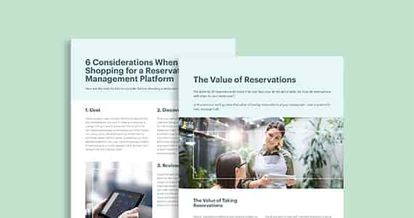Opening a restaurant takes a lot of money and comes with a lot of risk. Sometimes, restaurateurs seek funding from restaurant investors to bring in more capital and mitigate risk.
However, working with investors adds new challenges to owning and operating a restaurant.
Are restaurant investors right for your restaurant?
We’re exploring that topic in depth to help you make an informed decision. In this article you’ll learn:
- What restaurant investors are
- When to look for them
- The pros and cons of bringing restaurant investors into your business
- How to find the right investors
You’ll even get tips from some of Miami’s top restaurateurs, who discussed restaurant investors at a recent TouchBistro Industry Sessions event.
What Are Restaurant Investors?
A restaurant investor is a person or business that puts money into a restaurant concept, helping to start or maintain a business. Restaurant investors give these businesses money, expertise, and connections in exchange for an ownership stake in the restaurant.
There are three main types of investors:
- Friends and family: Entrepreneurs typically fundraise through friends and family before approaching other investors. Unlike banks, friends, and family tend to be happier to give loans without crazy interest rates because the loans are based on trust. Friends and family who invest a significant amount may ask for an ownership stake in the business.
- Angel investors: Angel investors are wealthy individuals who have money to invest when others (like private equity or banks) find it too risky to invest in a business. A good angel investor will have expertise in the industry that they are investing in and can offer some guidance on business decisions.
- Venture capital firms: Venture capital firms invest in startups and small businesses that they think will make big profits. This type of investment should come with resources such as connections, marketing support, or supply chain recommendations.
There are different options when it comes to seeking investors for your restaurant! It all depends on your situation and business needs.

When to Look for Restaurant Investors
While you could seek out a restaurant investor at any time in your business, there are some critical turning points in a restaurant’s operations when an investment would be most useful.
Starting Your Business
Opening a restaurant requires a lot of cash. At the Miami Industry Sessions, restaurateurs Luciana Giangrandi and Alex Meyer shared that they needed more than $250,000 to start Boia De.
Shockingly, that’s less than most restaurateurs spend on a new restaurant. The average startup cost of a restaurant is $375,500. Unless you have an inheritance or have already founded – and maybe sold – a successful business, chances are you’ll need extra funds to hit that number. Investors can provide the capital needed to get a restaurant off the ground.
Beyond their money, investors’ expertise in the early days of a restaurant can be critical to the success of the business. Since almost one third of restaurants close within their first year in business, the odds of staying afloat are stacked against new restaurants. An investor bringing in money and valuable experience in the restaurant industry can give you insight and resources that will extend the life of your restaurant.

Download this customizable restaurant business plan template to create a professional business plan for your new venture.
Growing Your Business
Let’s say that your restaurant has been running successfully for five years. Now you want to grow the business. Whether you decide to open a new location, create a franchise, or work on a new concept, an investor can provide money to fund these ventures.
A restaurant investor could also introduce you to other investors who have gone through the franchising process, or give you the money to get a new commercial lease. Investors open doors when it’s time for you to expand your restaurant empire.
Save a Failing Business
Unfortunately, every business faces some hard times. If your restaurant is having a difficult time staying afloat, you may benefit from partnering with an investor who can infuse money into the operation and provide expertise to turn things around.
Turning things around may be as simple as needing some cash to hire more staff or to redesign the restaurant. An investor could provide those funds.
In terms of expertise, an outsider can bring a fresh perspective to help you analyze what’s going wrong with the business and flip it into a success a la Restaurant: Impossible.

The Pros and Cons of Bringing Restaurant Investors Into Your Business
Getting an investment sounds sexy, but is it all it’s cracked up to be?
We’re uncovering the benefits and struggles of working with restaurant investors, and sharing insight from Miami’s top restaurateurs.
Pros of Working with a Restaurant Investor
These are some upsides to bringing an investor into your restaurant.
Expertise
It’s hard to make it in the restaurant industry without help, especially if it’s your first time opening a restaurant. A restaurant investor with a proven track record can help your business overcome obstacles.
Investors can also support your business with their passion. Miami restaurateur Mike Beltran recommends finding investors who are “partners and not just investors. [They should] believe in the concept or the food as much as you do.”
When investors share your passion for your restaurant, they’ll work harder to ensure its success.
Money
The restaurant industry is infamous for its low profit margins, with the average for FSRs sitting at 11%. Because of this, restaurants usually don’t have a lot in their savings accounts. If tough times hit, it can be difficult for restaurants to survive. Investors can give you a cushion of funds to help you make payroll, pay vendors, or deal with other surprise expenses when business is slow.
Beyond helping with these everyday expenses, investors are excellent for infusing capital to help you start a business, upgrade equipment, or expand to a new location.
Connections
Experienced restaurant investors have connections in the industry and can introduce you to industry experts, partners, and business opportunities that you may not have otherwise had the chance to connect with.

Download this customizable restaurant business plan template to create a professional business plan for your new venture.
Cons of Working with a Restaurant Investor
All of those pros sound great, but bringing on an investor isn’t always a cakewalk.
Give Up Some Control
Investors may take partial ownership of your business in exchange for their investment. This means that you have to consult your investor before making business decisions. This collaboration can get especially tricky, especially if you don’t own the majority of your restaurant.
Niven Patel of Erba considered working with investors but didn’t like that he would “retain only 10 to15% of [his and his wife’s] life’s work.”
When investors have to approve your decisions, it can feel like your business is no longer your business.
Give Up Profits
In addition to forfeiting some control of your business when you take on a restaurant investor, you also no longer own all of the profits you make. The restaurant industry already has slim profit margins, partnering with an investor reduces your cut even further.
For example, if an investor owns 40% of your restaurant and its annual profits are $100,000, then you take home only $60,000 of that and the investor gets the rest.
Difficult to Find Trustworthy People
Many restaurateurs who seek investors complain about not being able to find people who they could trust.
“There [are] so many snakes [in the investing world]. The first thing I tell every chef is make sure you have a good lawyer,” says Beltran. “[There are] a lot of people who are money hungry, who think they’re gonna turn a dollar real, real fast. And that’s just not how it works.”
If you decide to look for an investor, find someone who you can trust, who shares your passion, and who can provide value beyond their dollars.

How to Find Restaurant Investors
If you decide restaurant investors are right for your business, the next step is to find said investors.
So where and how do you find these angel investors for your restaurant?
You don’t have to be a millionaire to find people with money. Here are a few tips for finding investors:
- Talk to other restaurant owners who have used investors. Who did they work with? Where did they find them? Would they recommend working with their investors, or does their investor know anybody else looking to get involved with a restaurant?
- Join an incubator. There are food-related incubators in cities around North America, such as Branchfood in Boston and the Hatchery in Chicago. Most of them will connect you with investors or resources for finding investors.
- Use investor databases. There are many online databases that share information on venture capital firms and angel investors who have given money to companies. Use these databases to find a good fit for your restaurant. Search by city and past investments.
- Look for investors via LinkedIn. LinkedIn’s powerful search tools can help you find people by city, industry, and company. Look for venture capitalists who have shown an interest in restaurants or angel investors with similar interests. Make sure to complete your personal LinkedIn profile so that investors who you reach out to know exactly who they’re reaching out to.
- Networking events. Look for events in the restaurant industry, attend conferences, and expand your network. It’s a great opportunity to meet new people who could introduce you to an investor or become one!
Once you start meeting with investors, you’ll want to come prepared. Your passion will only get you so far.
Here’s what you need to show restaurant investors to get them on board.
- A business plan: This document demonstrates that you’re serious about your business and know what you’re doing. You don’t need a business school degree to create a business plan!
- Pitch deck: Create a presentation that gives investors information about your business, what makes it special, why they should invest in your vision, and how they can invest. For inspiration on how to make your pitch deck and presentation exciting, watch a few episodes of Shark Tank.
- Numbers: Investors need to see the numbers! Show them you know how to handle money before they give you more of it. Be prepared to show key figures, like how much the restaurant is worth, who owns how much of the company, and forecasted growth, to name a few areas.

Download this customizable restaurant business plan template to create a professional business plan for your new venture.
The restaurant industry is a tough one to succeed in. When you do it on your own, you have more risk of failure, but you also own all of the business. When you bring on restaurant investors, you have more money to work with and expertise to increase the longevity of the business, but you lose control and profits.
Deciding whether or not to work with an investor is a personal decision. Whatever you decide to do, we wish you success!
Download our free inventory template
Sign up for our free weekly TouchBistro Newsletter







